Patriotic fervour on the rise in Russia
- Published
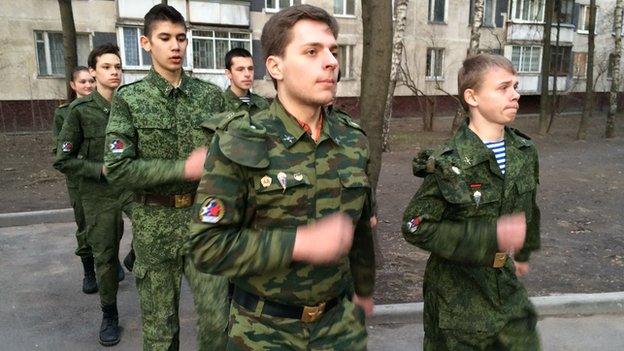
Cadets practise army drills
In a car park outside a block of flats in Moscow, a dozen Russian teenagers in camouflage are practising army drills.
A young lieutenant barks out orders. They form a wobbly line and march up and down on the spot.
Inside another group of kids are learning how to handle weapons - firing blanks down an empty hall way to improve their aim.
This after-school club is ostensibly part of a drugs prevention programme: a programme of evening activities with a patriotic military slant, aimed at keeping local kids away from drinking and shooting up.
But for the club's organiser, Stepan Zotov, it is much more than that.
It is an invisible army getting ready to defend the Fatherland.
"This rise in patriotic feeling during the last years must have had a foundation. And we are this foundation," he explains with a gleam in his eye.
"For the last 10 years, clubs like ours have worked tirelessly, fanatically I could say, to raise a generation of young people who believe in the mission and idea of Great Russia."
Mr Zotov's English is near perfect - polished at international conventions of the table top fantasy war game, War Hammer, through interaction with other fans.
He exacts demanding standards from his young charges.
What is being instilled in them is not just patriotism, but self-discipline and obedience.
"Russia is a military power. Our state is in a state of constant readiness to repel aggression.
"To be a warrior in Russia is not just a profession, it is a sacred calling. It is actually sacred, holy."
Real war
The teenagers are lapping it up.
One boy, 14-year-old Alexander, wants to go into the army.
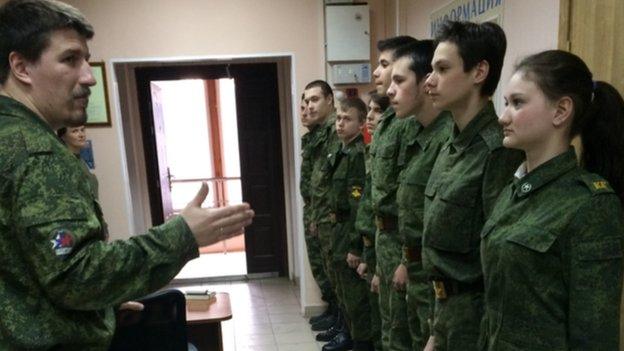
Stepan Zotov supervises training
A girl, 16-year-old Anna, would like to join the Russian border guards or the intelligence service, the FSB.
And now there is an actual war to fight in - the conflict in Eastern Ukraine, or Novorossiya as these patriots call it.
Stepan does not hide the fact that he and some of his cadets have been there to fight.
"We couldn't be regulars there, but for a week or a month or two, as much as we can give. This is all part of a great territory which has been part of Russia for many centuries.
"Part of our nation and our cultural space and we must protect them."
Not surprisingly Mr Zotov would like to see these eastern Ukrainian regions become part of Russia.
The vision is part Russian nationalist, and part Soviet: a return to the state of affairs before the USSR collapsed in 1991, when Russia and the territories around it were one country.
A curious hybrid of nostalgia for the Soviet era - multicultural and secular - and a more nationalistic religious adherence to what are described as Russian Orthodox ideas and spiritual values.
Either way, it is a vision of Russia as a country with a unique destiny, perpetually under threat from abroad, alone and misunderstood.
Aid drive
In a warehouse in another Moscow suburb, a woman called Elena and a man called Andrei are busy sealing up boxes of aid for the suffering civilians of Donetsk and Luhansk in Eastern Ukraine.
A monastery has donated bags of maize and buckwheat, dry macaroni, sugar and dried milk.
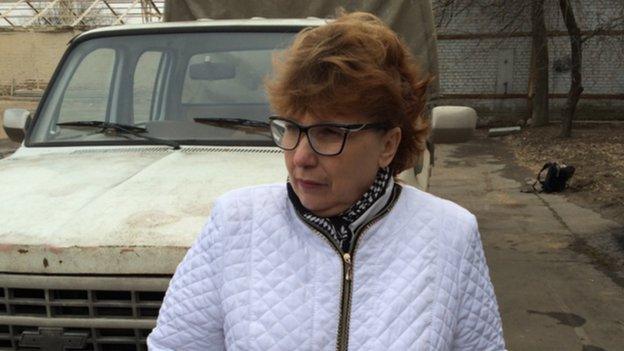
Elena helps collect aid for civilians in Eastern Ukraine
There are huge sacks of second-hand clothes and shoes donated by well-wishers too.
Andrei is coy about his background but indicates that he is a former FSB intelligence officer who has also served in Eastern Ukraine.
"I was in the Ghost battalion with the rebels, but I didn't fight. I was engaged in information questions," he says.
He reveals he also served in the last war in Chechnya and took part in the operation last year to take Crimea.
He is dismissive of the current ceasefire in Ukraine, but won't be drawn on what he thinks should happen to Eastern Ukraine.
"The decision about where Novorossiya should go - Ukraine or Russia - should be taken by the people there," he says.
Deeper confrontation
He plays down the idea that the current crisis will lead to a war with the West.
But it is clear that for these Russian patriots, the Ukraine conflict is only a symptom of a much deeper confrontation, where Russia's real opponent is and always has been Europe and the West.
"Whoever tried to wage war against us, France, Germany, the Polish and everyone else - there were never any friends, only interests - a desire to destroy Russia and make her a donor of natural resources for other states," says Andrei.
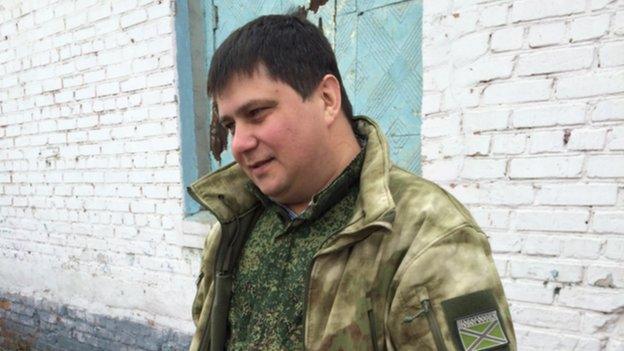
Andrei sees the West as the opposition
Back at the after-school patriotic club, Stepan Zotov puts it more bluntly.
In his view, even the alliance against Hitler in World War Two was only a temporary arrangement, born out of mutual defence interests. Russia and the West were never on the same side.
"We understand very sharply the great and undeniable gap between Russian culture and Western culture," he says.
"For 60-70 years, there has been no fundamental change. Then or now, you are our enemy. And we have no illusions about this state ever changing. You are a different civilisation."
What is curious is that he manages to make this sound both chilling and somehow amicable at the same time, as though the aggressive ultra-nationalistic rhetoric against foreign enemies is on one level, and day to day dealings with individual foreigners is on another level altogether.
But when it comes to what these patriots call "national traitors"- Russia's enemies from within - the benevolence disappears.
Bikers' club
Behind a tall fence on the edge of Moscow lies the territory of Russia's most famous bike club, the Night Wolves.
It looks like a cross between a medieval fortress and film set for Mad Max movie or Kevin Costner's Waterworld.
Carcasses of old motorbikes have been crafted into gothic sculptures.
The main entrance is flanked by two stuffed snarling wolves.
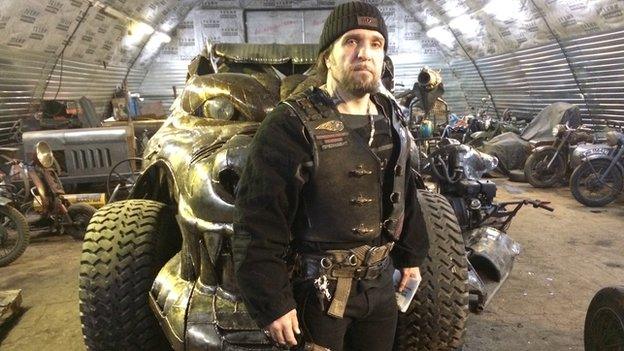
Alexander Zaldostanov was an instigator of a movement to stop an uprising in Russia
In the workshop a scary looking biker with a shaved tattooed head who goes under the name of Bulldog shows off the show bikes, on the orders of his chief.
Alexander Zaldostanov, known as The Surgeon, is a long-time Russian nationalist.
His club enjoys President Vladimir Putin's patronage.
He is on the Western sanctions list. And he was one of the instigators of the so-called 'Anti Maidan movement, external in Moscow, set up to stop a Kiev-style uprising from happening in Russia.
Its big rally in Moscow in February included banners vilifying both the West and Russian opposition figures, and came just days before the assassination of opposition politician, Boris Nemtsov.
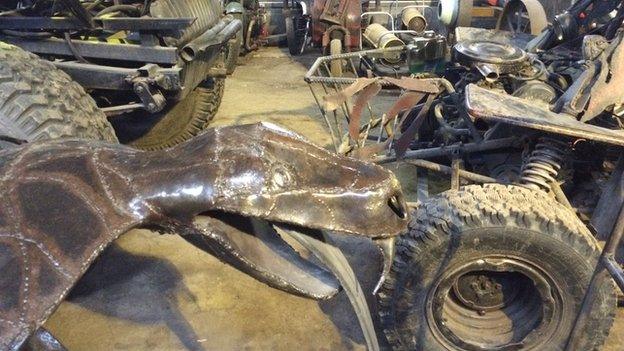
Inside the Night Wolves workshop
Interviewed at his headquarters, Mr Zaldostanov blamed the Nemtsov murder on provocateurs, but was in no doubt that the biggest danger facing Russia at the moment was the so-called Fifth Column of national traitors.
"This issue is very important. Is it one of my duties - to resist the actions of the Fifth Column - that is those people who work for other governments and not for their homeland and for other people's money," he says.
"It has happened to us before, an entire army composed of traitors fighting against their own people. It is a terrible enemy, the number one enemy facing Russia."
Mr Zaldostanov was quick to add that the way to combat this 'internal enemy' should not be through violent means.
But a national campaign against the Fifth Column in Russia has already been espoused by Mr Putin and enshrined in a new law against so-called Foreign Agents - non-governmental organisations, especially those engaged with political or human rights work, who have links or funding from abroad.
'Foreign agents'
Sipping tea in her antique-filled apartment, Elena Nemirovskaya does not look like a threat to anyone.
But her legendary School of Civic Education was recently added, external to the Ministry of Justice blacklist of Foreign Agents, so she and her husband have decided to close it.
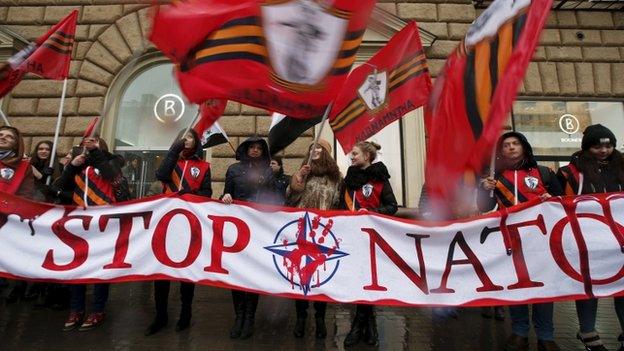
The Anti-Maidan movement supported the Russian government
For more than 20 years she brought European political experts to Moscow to educate young Russians from all over the country in the importance of the rule of law and democracy. But not any more.
"We are not continuing this school because they have humiliated us. How can we come to Russian regions and work with people?" says Mrs Nemirovskaya.
"Foreign Agents in Russian means foreign spy. We cannot agree with this title. We are not."
Nonetheless she is not entirely giving up. She still runs e-seminars via Skype for those interested enough to phone in.
"One day civic society will be strong again," she says. "It may take a long time, but we have so much more work to do."
Blacklist
Golos is another Russian non-governmental organisation, a nationwide election monitoring network, which has found itself on the Ministry of Justice blacklist.
Ironically it had voluntarily cut foreign funding to protect itself, but fell foul of the new law when it was sent prize money for an international human rights award.
Roman Udot, who runs the Moscow office, explains that they fought back by changing their status from 'association' (a legal entity in Russia) to 'movement', in other words a group of individuals with no legal status.
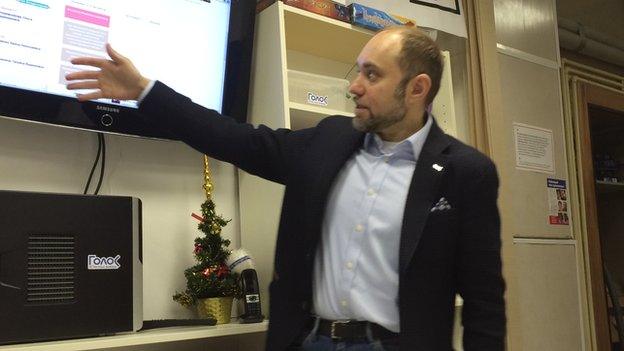
Roman Udot is hopeful about the future
Then they used the publicity from the court case to ask supporters online for funds to pay off the fine of 400,000 roubles.
The crowdsourcing appeal worked. Before long they had collected 1.8 million roubles - an interesting insight into the extent of quiet support for oppositional activity which still exists below the radar in Russia.
Mr Udot says their new unofficial status has restricted their access to polling stations, though they still manage to do some monitoring with the help of sympathetic election observers and journalists.
But he is worried about the future.
Already the head of one Golos branch in the lower Volga region has been targeted as an individual, facing multiple charges of acting as a 'foreign agent', tax evasion and criminal activity.
So what does the future hold?
Alongside his anxieties about how his civic activism will survive, Roman Udot is not down-hearted.
Fast change possible
He even wonders if the apparent strength of the Putin government conceals a lack of resilience, and actually the current state of affairs might change unexpectedly fast, as it did in 1991.
"Will Putin be in power for a long time? Nobody knows, but this is Russia," says Mr Udot.
"Remember the attempted coup (by hard line communists) in 1991? Those of us who were resisting, we were expecting to be killed right under the walls of the White House. But we won! In just three days!
"The Soviet system had tortured people for 70 years, but in three days it was over, almost without a shot. So nobody knows."
But this scenario is dismissed as fantasy by Russia's patriots.
They believe they are in the ascendancy and that the current crisis in relations with the West has only advanced their cause.
They are convinced that many people in Russia support them and they have the backing of the Kremlin.
"There is no opposition actually," says Stepan Zotov.
"It just exists to create an illusion maybe for Western countries that we have some kind of opposition.
"Putin might have his mistakes but obviously he is the best option," he adds.
"There is no-one else. He is the best hope for a united future, for the resurrection of Russian destiny."